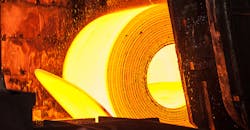The deal announced in December for Cleveland-Cliffs Inc.’s purchase of AK Steel Holding Corp. closed March 13, according to a press release from Cleveland-Cliffs. The $1.1 billion deal brings the largest producer of iron ore pellet in North America and AK Steel’s flat-rolled carbon, stainless and electrical steel production under the same roof.
CEO of Cleveland-Cliffs Lourenco Goncalves, in a statement, said “This is a new era for Cleveland-Cliffs as a producer of differentiated, high quality iron ore, metallics and steel in North America.” He said the new company would begin from a “unique position of strength” for the industry and listed some of its diverse assets. Cleveland-Cliffs now controls two integrated blast furnace steel mills, two electric arc furnace plants and a “new state-of-the-art” plant for hot briquetted iron.
In December, when the deal was announced, Goncalves said the purchase would give AK Steel a “competitive advantage in a troubled industry” and provide the combined company a potential opportunity to grow into merchant pig iron. On the subject of a mill in Ashland, Kentucky with the potential to produce merchant pig iron, Goncalves said in December that the decision to re-open the mill would depend on profitability. “We’d love to generate jobs there,” he said to investors, “but the clients need to understand that we don’t work for free, and we have to earn our cost of capital.”
The deal closes just as the COVID-19 outbreak in China has hammered an international trade economy preparing to reap the benefits of a trade war détente. On March 11, a group of five manufacturing trade associations published an open letter to CEOs affected by supply chain disruptions and encouraging them to source materials domestically.
The letter was co-signed by the American Mold Builders Association, the National Tooling and Machining Association, the Precision Machined Products Association, the Precision Metalforming Association and the Technology and Manufacturing Association.
“Companies need to look no further for suppliers than right here in the U.S.,” they wrote.
About the Author
IW Staff
Find contact information for the IndustryWeek staff: Contact IndustryWeek
